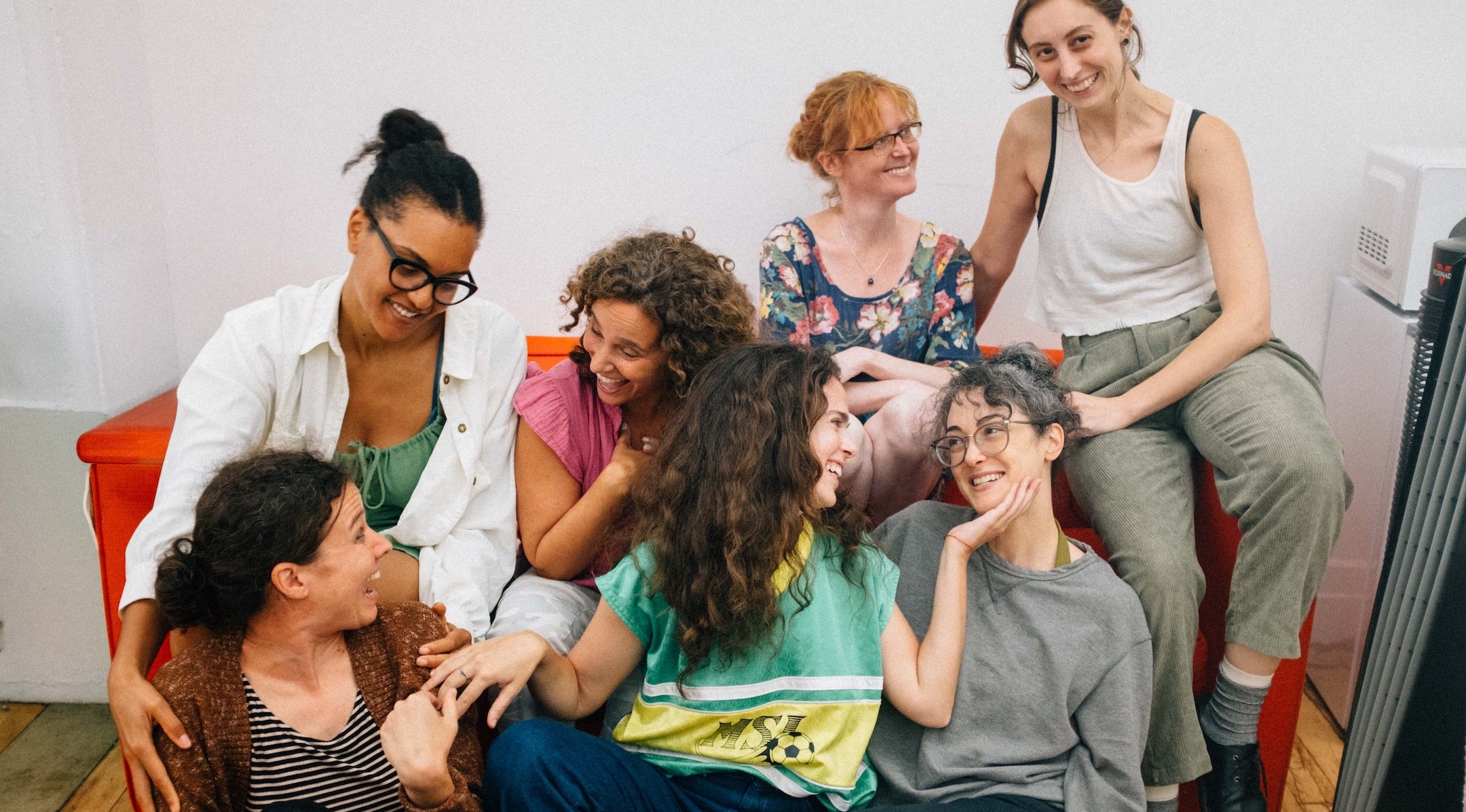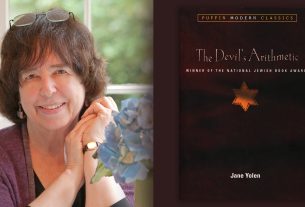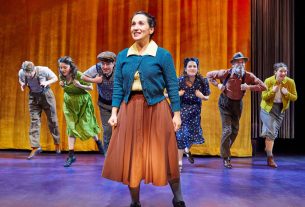By the time the playwright Liba Vaynberg and I manage to steal a few minutes on Zoom, it’s already midday on a Friday, which means I’m running late from an appointment at a wig maker and frantically marinating a chicken for Shabbat dinner.
I wouldn’t normally describe the circumstances of an interview in an article, but it seems relevant given the subject of Vaynberg’s upcoming play, “The Matriarchs.” It’s a deeply Jewish work that follows six recently bat mitzvahed Modern Orthodox girls — as well as a snippy yet maternal, possibly omniscient voice off-stage — as they move from their early teens through adulthood, and face struggles with faith, fertility, marriage and grief.
Opening on Sept. 10 at Theaterlab, “The Matriarchs” begins with the heroines — who are all loosely based on Biblical foremothers, such as Miriam and Sara, with whom they share names — as middle schoolers studying Talmud in a basement in suburban New Jersey. Their banter covers everything from childbirth to snacks to whether squeezing a blackhead is forbidden on Shabbat (on this, they ultimately reach a tentative agreement). The overall effect is “Gilmore Girls” meets Chaim Potok. Or maybe, with its rapid-fire, heavily female dialogue, it’s closer to Lena Dunham’s “Girls” — if the titular girls were rabbinic sages rather than Brooklyn hipsters.
The opening scene feels so authentic that it’s surprising to hear Vaynberg, who is “in her thirties,” has never studied Talmud herself. The daughter of Jewish emigres from the Soviet Union, Vaynberg describes her West Coast Jewish upbringing as “eclectic, and I’m very grateful for that.” She attended Chabad schools through fifth grade — like many Russian Jewish families, the Vaynbergs found a welcoming environment at Chabad — but was not traditionally observant at home.
By her teenage years, Vaynberg switched to a secular school; at Yale, she studied molecular biology, thinking she’d be a doctor. (Vaynberg’s parents, she said, still find her change of career path “devastating.”) She now lives in the Bronx, where she attends a progressive Orthodox shul, with her husband and young daughter (and one on the way).
The idea for “The Matriarchs” came in 2021, after she witnessed a Shabbat afternoon study session for young Orthodox girls led by a college friend of her husband’s, a female Talmud teacher. “I’m a big fan of the movie ‘Yentl,’” Vaynberg said, “but I had never actually heard women or girls fully embody a Talmudic space.”
Inspired, she began to envision a play populated with young girls like these, but structured like the Talmud, which is dominated by male voices. Like in the canonical text, Vaynberg’s characters are meant to be focused on one core issue, but frequently go off on tangents and contradict each other and themselves in the process. (In the script, the setting is listed as “wherever the Torah didn’t bother with its women.”)
For the actor Arielle Goldman, who plays the theatrical, doomed Rachel and who, in real life, attended Jewish day school from kindergarten through twelfth grade, playing a version of herself onstage was “surreal.”
“It felt really exciting to be in a play that’s taking these girls and their reality and really normalizing their experience,” Goldman, who describes her upbringing positively but characterized her younger self as “a little bit rebellious,” said.
The play “really initiated a lot of memories” for her, like the time she found herself grating when a camp friend told her women didn’t need to read from the Torah because they were “naturally more spiritual” than men. That’s exactly the type of feminist awakening that could have been lifted straight from Vaynberg’s script.
The play’s very specific setting still manages to be inviting to those with little or no personal experience with Orthodoxy. Though costume designer Johanna Pan was tasked with outfitting characters in modest wedding gowns and wigs, they come from a background far removed from tri-state area Jewish environs: a devout Christian community in Singapore.
As the daughter of a prominent Presbyterian pastor, Pan, who now identifies as agnostic and “the black sheep” of her own family, related to the characters who found themselves bristling under the strictures of communal expectations. “The things that these girls are going through, which is a sense of growing up and grappling with your faith, and who you are and what your identity is, whether or not you live inside of that community, I think is something that is very universal,” they said.
Most of the performances, which run through Sept. 28, will include a talkback. That’s theater-speak for an onstage conversation after the show, usually including the playwright, director or cast members. At “The Matriarchs” many of the featured talkback guests, who include the Yiddishist Rokhl Kaffrisen and the creator of the web series “Soon By You,” Leah Gottfried, are some flavor of observant themselves. (Full disclosure: I’m doing one on Sept. 25.)
Talkbacks are famously divisive — in 2017, David Mamet announced that any productions of his work that included talkbacks could face hefty fines. But Vaynberg sees them not only as a way of potentially deepening the audience’s understanding of the play, but also as an “important litmus test” for whether she’s doing right by the community she’s depicting. “We’ve all been to the shows where Orthodox stuff is misquoted or misrepresented,” she said. “If [featured guests] feel seen by the play, then that’s hopefully a sign that I’m doing something that makes them proud to be represented in the theater.”
I’ll avoid spoilers here, but suffice it to say those with a cursory knowledge of Torah plot lines might see some of these character’s arcs coming. Noticeably absent from the story, though, are some of the standard tropes of Jewish art today, whether it’s the “brave young person flees repressive sect” — a la the Netflix series “Unorthodox” — or a fixation on the Holocaust or Israel, though the ongoing conflict there has cast a pall over so much of the discourse since Oct. 7, 2023.
“It’s a complicated time to produce Jewish art, and a lot of companies are actually explicit about the fact that Jewish art is something that they’re not necessarily going to be leaning into,” Vaynberg said.
But it was important to her that she turn her attention — and in turn, prompt others to turn theirs — to some of the less examined parts of the modern Jewish experience. “The Holocaust and Israel, these are not the only things we are,” she said. “And there’s just not enough art about all the other things that we are.”
“The Matriarchs” plays at TheaterLab (357 West 36th St.) Sept. 10 through Sept 28. Click here for tickets.
Jewish stories matter, and so does your support.




